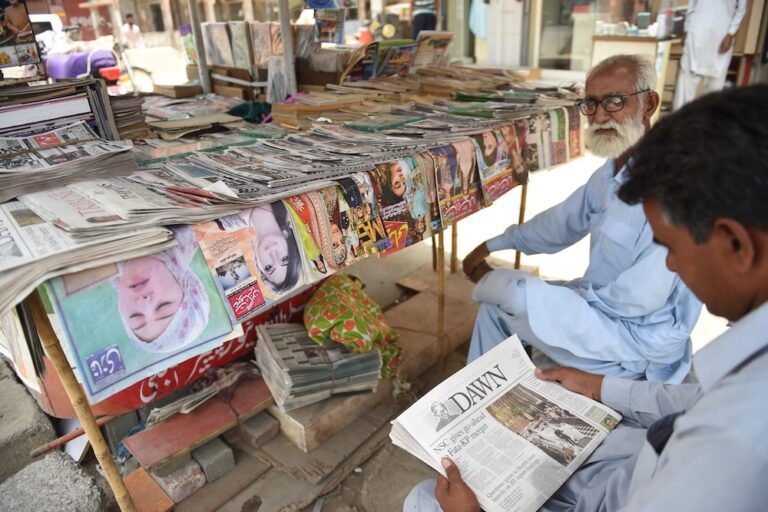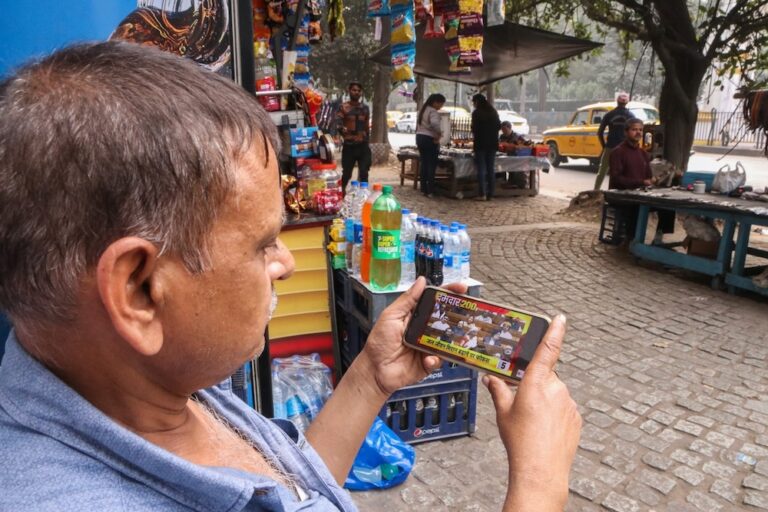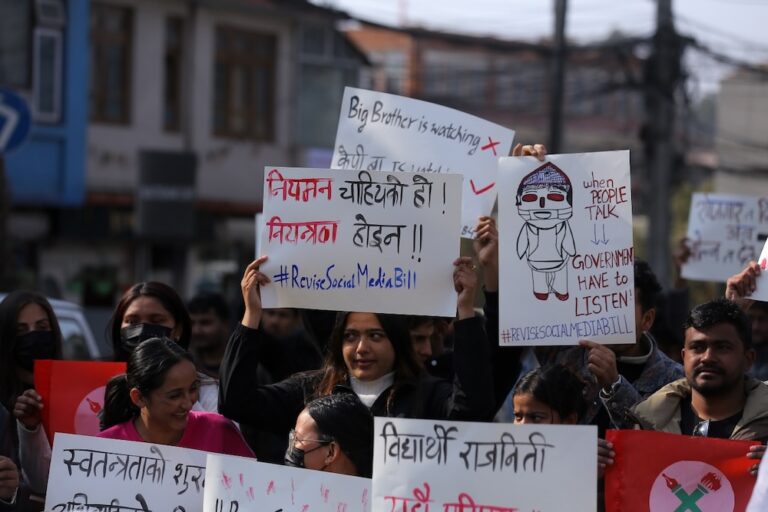November in Asia-Pacific: A roundup of key free expression news, based on IFEX member reports
100 days of internet shutdown in Kashmir
In a series of short video interviews Reporters Without Borders (RSF) released in November to coincide with the 100th day of internet shutdown, local journalists narrate the work challenges they faced after Indian authorities imposed a communications blackout in the Kashmir region. The Kashmir Reader’s Junaid Bazaz shared his difficulty in filing reports: “A story that I used to be able to do in three or four hours now takes me at least five or six days.”
The shutdown of communication networks has affected not just the media but also other segments of the local population. On 4 August, 6 million people suddenly lost contact with their friends and relatives outside the region. The disruption gravely affected the delivery of health services, education, and the livelihood of ordinary citizens. Communication lines have been partially restored, but the internet remains blocked, making it difficult to monitor the situation inside Kashmir and Jammu and the crackdown on opposition groups.
Artists under attack
A local court in Myanmar has sentenced six members of the Peacock Generation Thangyat troupe to one year in prison for a performance that allegedly insulted the military. They were charged in April after performing a satirical slam poetry known as thangyat during the water festival. Military authorities also accused them of posting ‘defamatory’ content on Facebook. Human rights groups said the court conviction reflects the military’s intolerance of criticism and the legal obstacles that writers and artists in Myanmar continue to face, despite the supposed restoration of civilian rule in the country.
In the Philippines, 11 members of the cultural group Teatro Obrero were nabbed by the police in a massive operation which was quickly denounced by human rights advocates as part of an ongoing crackdown on activist groups and other dissenters. The theatre group performs an annual reenactment of the Escalante Massacre, which claimed the lives of 21 farmers on 20 September 1985. The arrested performers were released after six days in detention.
In Pakistan, an art exhibit titled ‘Killing Fields of Karachi’ at the Karachi Biennale 2019 was vandalised and later on closed from public viewing. The installation of 444 tombstones by sculptor Adeela Suleman portrayed the 444 victims of extrajudicial killings by a notorious police officer in the past decade.
Malaysian writer Maryam Lee is being investigated by religious authorities after publishing a book narrating her decision to stop wearing the hijab. She found support from groups in and outside of the country who defended her right to express her views. Salil Tripathi, chair of PEN International’s Writers in Prison Committee, emphasized that “Placing restrictions on critical voices, even if their views may hurt the devout, is wrong.”
Melanesia media freedom
Journalists from Fiji, Vanuatu, Solomon Islands, Papua New Guinea, and West Papua gathered in Brisbane, Australia for the inaugural launch of the Melanesian Media Freedom Forum which was organized in response to ‘increasing media repression’ in the region. Several issues were tackled during the forum, including surveillance, workplace conditions, climate change, and the impact of social media.
One of the demands of the participants was addressed to the Vanuatu government, which had rejected the visa renewal petition of Daily Post media director Dan McGarry. The government was asked to reconsider its decision and allow journalists like McGarry to do their work without fear of reprisal. McGarry said his visa was denied because of his criticism of China’s growing influence in Vanuatu.
Victory for Hong Kong’s pro-democracy candidates
Hong Kong’s pro-democracy candidates clinched a landslide victory in the district council elections, confirming that the massive protests that have been going on since June have overwhelming public support.
Violent clashes continued to escalate just days before the 24 November election. There were reports that live rounds were used by the police to disperse protests. The Hong Kong Polytechnic University became a major site of confrontation, which led to a siege of the campus and hundreds of injured protesters.
Activists also raised concerns about an interim injunction issued by the High Court prohibiting the posting and re-posting of any information that promotes violence. They warned that this would undermine internet freedom in Hong Kong. The Internet Society [Hong Kong Chapter] noted that: “The injunction provisions are overbroad, anyone who issues comments on police brutality and criticism of the government could potentially be construed to be “inciting, aiding or abetting” others to commit unlawful acts. The injunction can even go further to include those who simply ‘like’, shares and respond to the comments.”
In brief
First, some positive updates amid a flurry of frustrating news about threats against media freedom.
In Australia, a landmark decision by the Fair Work Commission affirmed the position of IFEX member MEAA that digital media workers should have access to the same protections and rights as print journalists. MEAA Media director Neill Jones said: “The Fair Work ruling means that if you work for a digital media start-up or a digital-only publication you are no longer treated as a second-class journalist.”
At least 70 political prisoners were released from detention in Cambodia. The majority were members of the dissolved opposition Cambodia National Rescue Party. Another prisoner released on bail was Kong Raiya, who was arrested in July during the third anniversary of the murder of political analyst Kem Ley. CCHR Executive Director Chak Sopheap commented on the case of Kong Raiya: “The case is emblematic of the use of arbitrary and retaliatory prosecutions to silence critical voices in Cambodia and forms part of a broader pattern.”
Award-winning writer Behrouz Boochani, who sought asylum in Australia in 2013 but has spent the last six years in offshore detention facilities on Manus Island and Port Moresby, is finally free. The Iranian-Kurdish refugee, who documented the plight of inmates at Manus, tweeted that he had safely arrived in New Zealand:
At the United Nations, a joint statement of concern deploring the persecution of Turkic Muslims in Xinjiang and China’s ‘brutal treatment’ of 13 million Uyghurs was delivered at the General Assembly.
Responding to reports that Indian journalists and scholars were targeted in a Pegasus spyware attack, IFEX member SFLC.in reiterated its demand for the passage of a comprehensive surveillance reform law to protect the rights of citizens.
In Vietnam, several activists and journalists were arrested and convicted on national security charges. Journalist Pham Chi Dung was arrested days after calling on the European Union to postpone ratifying a trade agreement until Vietnam improves its human rights record. Meanwhile, veteran blogger and activist Pham Van Diep was sentenced to nine years in jail for posting, liking, and sharing information on Facebook “that aims to oppose the State of the Socialist Republic of Vietnam.”
Focus on gender
Media Matters for Democracy released its research on the extent of online harassment women journalists in Pakistan face and its impact on their mental health and professional advancement. Another MMfD initiative – part of the campaign ‘16 Days of Activism Against Gender Based Violence’ – is the online curation of testimonies based on the hashtag #WhyIDidntReport, which explores why people choose to not report their experiences of sexual violence.
In India, the passage of the Transgender Persons’ Bill 2019 at the Rajya Sabha (Upper House of Parliament) was opposed by members of the transgender community for containing provisions that would actually engender further discrimination against the sector which the bill has intended to protect. Aside from failing to consult the transgender community, legislators ignored the concern of LGBTQI+ advocates that the bill will ‘dehumanize’ transgender persons by establishing a ‘screening committee’, rejecting reservation for transgenders to avail of some services and livelihood opportunities, and proscribing lighter sentences for crimes against trans people.
New and noteworthy
IFJ and the South East Asia Journalist Unions released a new report titled ‘Holding the Line: South East Asia Media Freedom Report 2019’ which outlines the issues and challenges that undermine press freedom in the region. Some of the issues it tackled include the internet shutdowns in Indonesia and West Papua, the mass lay-offs in Thailand and Malaysia, and the unabated killing of journalists in the Philippines.
Another IFJ report focuses on the attacks against the media in South Asia. The group’s monitoring recorded impunity cases in India, Afghanistan, Pakistan, and Sri Lanka.
China is still the world’s worst abuser of internet freedom, according to a report by Freedom House. The study also noted that China is already a global leader in “developing, employing, and exporting automated tools for mass surveillance of social media.”
And finally, check out this IFEX Spark multimedia feature on the ten-year campaign demanding justice for the victims of ‘Ampatuan massacre’ in the Philippines. The verdict for the case involving the world’s deadliest attack against the press on a single day will be announced on 19 December.
Africa
Americas
Europe
Middle East & North Africa



